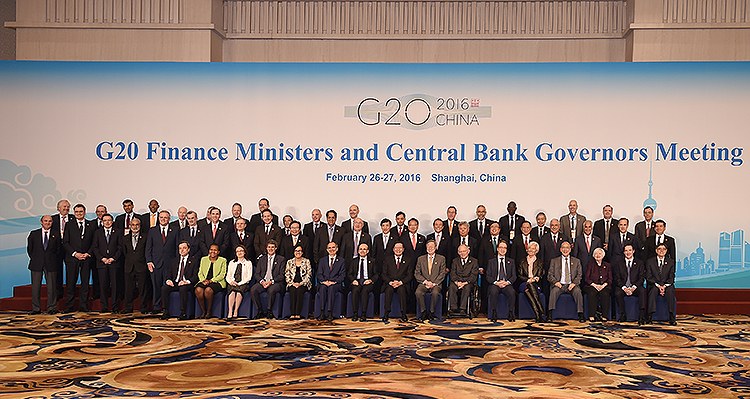2016年首次二十国集团财长和央行行长会议在上海举行
发布日期:2016年02月27日
2016年2月27日 来源:国际经济关系司
2016年2月26至27日,二十国集团(G20)财长和央行行长会议在上海举行。这是中国担任2016年G20主席国后主办的首次G20财长和央行行长会议。国务院总理李克强向会议发表视频讲话,财政部部长楼继伟和人民银行行长周小川共同主持了会议。会议主要讨论了当前全球经济形势、增长框架、投资和基础设施、国际金融架构、金融部门改革、国际税收合作、反恐融资、绿色金融及气候资金等议题,并发表了联合公报。
会议认为,全球经济形势继续复苏但并不均衡,下行风险和脆弱性加大。在认识到这些挑战的同时,会议认为近期市场的过度波动与全球经济基本面温和复苏的状况并不相符。会议强调将各自和共同采取所有政策工具,包括货币、财政政策和结构性改革等,来应对风险、增强市场信心和促进经济增长。会议提出将灵活实施财政政策,并确保债务率保持在可持续的水平。货币政策将继续致力于促进经济增长和保持价格稳定。会议重申将避免竞争性贬值,反对各种形式的保护主义,并同意就外汇市场进行密切讨论沟通。会议同意将继续研究G20在必要时可能采取的政策措施,以支持增长和稳定。会议同意进一步加强结构性改革议程,包括制定改革的重点领域和指导原则,以及建立一套指标体系以更好地评估和监测各成员结构性改革进展。会议同意研究应对全球贸易和投资疲软的政策措施。
会议重申继续推进基础设施投资,鼓励多边开发银行制定支持高质量项目的量化目标,加强新老多边开发银行合作,并将启动全球基础设施互联互通联盟倡议。会议欢迎2010年国际货币基金组织(IMF)份额和治理改革生效,支持在2017年年会前完成IMF第15次份额总检查,并支持世界银行按照达成一致的路线图和时间表实施股份审议,逐步实现平等投票权。会议承诺将更好地监测资本流动,及时识别风险,应对大规模资本流动波动挑战,并强调充足和有效的全球金融安全网的重要性。会议支持就研究可能扩大特别提款权(SDR)的使用开展进一步工作。会议重申将继续及时、全面和一致地落实已有共识的各项金融改革,按计划推进其余标准制定工作,继续密切监测并应对金融体系潜在风险和脆弱性,总结宏观审慎框架和工具的经验教训,继续加强对金融市场基础设施的监管,并继续加强普惠金融议程。会议核准了关于全球落实税基侵蚀和利润转移(BEPS)项目的包容性框架。中国将建立一个国际税收政策研究中心,目的是进行国际税收政策研究和设计,并向发展中国家提供技术援助。会议承诺坚决打击恐怖融资,加强合作和信息交流。会议同意研究识别绿色金融面临的机制和市场障碍,并根据国别经验就如何增强金融体系动员私人资本开展绿色投资的能力提出方案建议,呼吁及时实施气候变化《巴黎协定》,并重申致力于落实2030可持续发展议程。
楼继伟部长表示,本次会议围绕G20杭州峰会“构建创新、活力、联动、包容的世界经济”的主题,在财金领域为G20杭州峰会进行必要的准备。中方愿与G20各方一起,携手同行推进G20财金渠道尽早锁定各项成果,为杭州峰会的成功举办打下坚实基础,为世界经济强劲、可持续、平衡增长做出贡献。
楼继伟部长表示,深化结构性改革是有效应对全球经济中长期挑战的根本手段,核心是矫正各种扭曲,改善资源配置。中国政府正在大力推进结构性改革。一是简政放权、放松管制。目前中央政府已精简几百项行政审批事项,所有城市都设有行政服务大厅,加快了相关审批事项的办理,极大地鼓励了创业和创新。二是价格改革,如对工商业十分复杂的天然气多轨价格实施并轨。三是鼓励创新,包括通过税收政策或设立社会资金参与的投资基金支持企业创新。四是优化财政支出结构,削减低效支出,包括减少不利于环保的相关支出、解决支出的碎片化问题等。同时加大对“去产能、去库存”的支持力度。五是推进以人为核心的新型城镇化。包括推进义务教育资源的可携带、统筹城乡居民基本养老、医疗保险、支持农民工进城就业和定居等。这些政策在短期内已取得较好成效,并对经济增长具有促进作用。当然,我们也在积极推动更为困难的改革任务。目前看,改革总的效果是好的,经济结构不断得到优化。2015年,中国经济中消费占GDP比重达到66%,服务业超过55%,投资占比大幅减少,但社会投资特别是技术设备投资增长较快。这些改革措施使资源配置得到改善,就业比较充分,居民收入大幅提高,支撑了全年6.9%的增长。今年,我们将保持中高速增长,这也需要通过适宜的总需求管理和推进改革来实现。
楼继伟部长指出,基础设施投资是推动经济复苏的重要引擎,并可提升潜在增长率,促进中长期经济增长, G20各国应进一步加大基础设施投资力度。楼继伟部长强调应对BEPS的重要性,呼吁G20尽快建立公平和高效的包容性框架,有效落实BEPS相关成果。
周小川行长介绍,中国经济已经步入“新常态”,经济由高速增长转为中高速增长,经济基本面保持稳健,增长的结构和质量不断改善,新的增长动力不断涌现,未来增长空间仍然可观,并将继续为全球增长做出突出贡献。在当前全球经济复苏乏力、风险上升的背景下,G20迫切需要改善和加强政策协调,包括共同促进全球经济增长和稳步复苏,在必要时就相关经济金融事务进行讨论沟通,并运用各自政策工具共同维护金融市场稳定。G20应继续强化结构改革议程,保持改革动力,为全球经济中长期强劲、可持续和平衡增长奠定坚实基础。
周小川行长表示,稳定的国际货币体系对经济增长和金融稳定不可或缺。中国作为G20主席推动重启了国际金融架构工作组。G20可通过重点讨论基金组织治理改革、国际主权债务重组体系和债务可持续性、跨境资本流动、全球金融安全网、提高基金组织特别提款权作用等议题,共同塑造更加平稳有序的国际货币金融环境。
周小川行长建议,G20应继续推动全球金融部门改革。G20可重点讨论如何全面、一致和及时地落实危机以来的改革措施,包括金融稳定理事会(FSB)历次向G20报告并经批准的各项改革,并按计划推进新监管框架的其余标准制定工作。G20还可探讨宏观审慎框架和工具在执行中的经验教训,关注市场化融资领域的潜在风险和防控手段,并推动加强对金融市场基础设施的监管。为使金融发展惠及所有人群,G20还可加强普惠金融议题讨论,重点关注数字普惠金融和指标与数据。
周小川行长指出,为促进更加可持续和环境友好型的增长,中方任主席国后推动建立了G20绿色金融研究小组,以鼓励各方根据各国国情特点,深入研究如何通过绿色金融调动更多资源用于绿色投资。
按照2016年G20财金渠道工作计划,今年第二次财长和央行行长会将于

First G20 Finance Ministers and Central Bank
Governors Meeting in 2016 Held in
The first G20 Finance Ministers and Central Bank Governors Meeting under the Chinese Presidency was held in
At the meeting, Ministers and Governors agreed that the global recovery continues, but it remains uneven. Downside risks and vulnerabilities have risen. While recognizing these challenges, Ministers and Governors judged that the magnitude of recent market volatility has not reflected the underlying fundamentals of the global economy. They stressed the importance of using all policy tools – monetary, fiscal and structural – individually and collectively to respond to risks, boost confidence and strengthen economic growth. Ministers and Governors agreed to use fiscal policy flexibly while ensuring debt as a share of GDP is on a sustainable path and agreed that monetary policies will continue to support economic activity and ensure price stability. Ministers and Governors reaffirmed that they will refrain from competitive devaluations, resist all forms of protectionism, consult closely on exchange markets, and continue to explore policy options that the G20 countries may undertake as necessary to support growth and stability. They agreed to further enhance the structural reform agenda, including by developing a set of priorities and guiding principles, as well as by creating an indicator system to further improve assessing and monitoring of the progress of structural reforms. Ministers and Governors agreed to explore potential policy measures to address the recent weakness of trade and investment.
Ministers and Governors reaffirmed their commitment to advancing infrastructure investment, encouraged Multilateral Development Banks (MDBs) to formulate quantitative ambition for high-quality projects and enhance cooperation among existing and new MDBs, and decided to launch a global infrastructure connectivity alliance initiative. Ministers and Governors welcomed the entry-into-effect of the 2010 International Monetary Fund (IMF) Quota and Governance reforms, supported the timetable for completing the IMF’s 15th General Review of Quotas by the 2017 Annual Meetings and the World Bank Group (WBG) to implement its shareholding review according to the agreed roadmap and timeframe, with the objective of achieving equitable voting power over time. Ministers and Governors committed to better monitoring capital flows, including more timely identification of risks to address challenges arising from large and volatile capital flows, and stressed the importance of an adequate and effective global financial safety net (GFSN). Ministers and Governors supported further work to examine the possible broader use of the Special Drawing Rights (SDR).They remained committed to timely, full and consistent implementation of the agreed financial reforms, and advancing the formulation of other standards as planned. Ministers and Governors reiterated that they will continue to closely monitor and address emerging risks and vulnerabilities in the financial system, take stock of experiences and potential lessons with macro-prudential frameworks and tools, and continue to strengthen the regulation and oversight of financial market infrastructures. Ministers and Governors remained committed to strengthening the financial inclusion agenda, and endorsed the inclusive framework proposed by the OECD for the global implementation of Base Erosion and Profit Shifting (BEPS) project.
According to Minister Lou Jiwei, this meeting is to make necessary preparation in the economic and financial area for the G20 Hangzhou Summit, under the theme of “Toward an Innovative, Invigorated, Interconnected and Inclusive World Economy”.
Minister Lou Jiwei said that structural reform is a fundamental approach to effectively addressing mid-to long-term global economic challenges. Correcting distortions and improving resource allocation are at the core of the structural reform agenda. The Chinese government is committed to promoting structural reforms. Firstly, streamline administration and loosen restrictions. The central government has streamlined hundreds of administrative approval items. Administrative service centers can be found in every city, accelerating administrative procedures and greatly encouraging innovation and entrepreneurship. Secondly, carry forward price reform such as streamlining the once complicated pricing scheme for industrial and commercial use of natural gas. Thirdly, encourage innovation including supporting corporate innovation through tax policies or investment funds with private sector participation. Fourthly, optimize the structure of fiscal expenditure, reduce inefficient expenditures such as those that are not environmentally friendly, and tackle expenditure fragmentation. Meanwhile, the Chinese government supports efforts of cutting overcapacity and destocking. Fifthly, promote new urbanization that is people-oriented, making subsidies for compulsory education transferrable across different regions, integrating the basic old-age insurance and health insurance systems for rural and urban residents, and providing support for migrant works to find jobs and settle down in cities. These policies have achieved good results in the short-term and promoted growth. We are also pushing forward more challenging reform tasks. In general, our reforms have achieved positive results, continuously optimizing the economic structure. In 2015, consumption contributed 66% to
Minister Lou Jiwei further stated that infrastructure investment is a significant driver of economic growth, which could raise potential growth rate and promote mid-to long-term economic growth. G20 members need to scale up infrastructure investment. He also emphasized the importance of addressing BEPS and called on the G20 to establish a fair, efficient and inclusive framework for implementation of BEPS-related outcomes.
Governor Zhou Xiaochuan noted, the Chinese economy has entered a period of “new normal” with growth shifting from high to mid-to-high speed. Economic fundamentals remain strong. The structure and quality of growth have been improving. Given rising new sources of growth,
Governor Zhou Xiaochuan further stated, a stable international monetary system is a key element to foster economic growth and financial stability.
Governor Zhou Xiaochuan suggested, the G20 should continue to advance financial sector reform. Discussions could focus on ensuring full, consistent and timely implementation of post-crisis reforms, including those reported by the Financial Stability Board and endorsed by the G
Governor Zhou Xiaochuan introduced, the Chinese Presidency has facilitated the establishment of the Green Finance Study Group to promote more sustainable and environment-friendly economic growth. The objective of the study group is to identify barriers to green finance, and develop options to enhance the role of the financial system to mobilize private green investment.
According to the Work Plan of G20 Finance Track in 2016, the second G20 Finance Ministers and Central Bank Governors Meeting will be held in
附件下载:
相关文章:






 京公网安备11010202000006号
京公网安备11010202000006号



